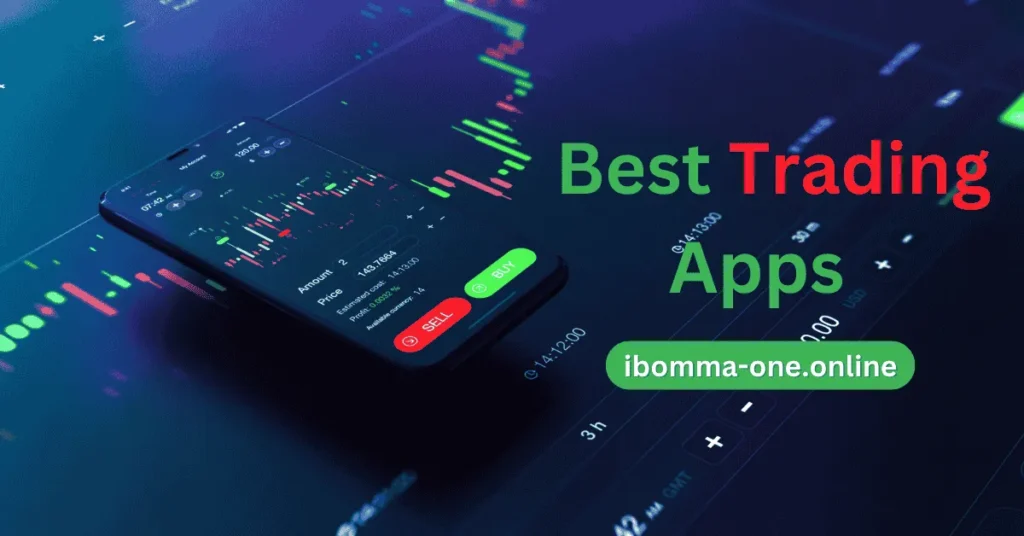
Introduction:
In recent years, the trading landscape has evolved dramatically, with mobile trading apps making it easier than ever for individuals to participate in financial markets. For beginners, selecting the right trading app is a crucial step that can impact their learning curve and overall trading success. In this article, we will explore some of the top trading apps for beginners in 2024, providing an in-depth analysis of their features, benefits, and how they differentiate themselves in an increasingly crowded market. We will also focus on Binance, a major player in the cryptocurrency space, and examine why it might be an excellent option for those just starting their trading journey.
1. Robinhood: The Beginner-Friendly Choice
Overview:
Robinhood has become a household name in the world of trading, primarily because it was one of the first platforms to offer commission-free trading. This revolutionary move has made it an appealing option for new traders, especially those just entering the world of stocks, ETFs, options, and cryptocurrencies.

Features:
- Simple and Clean Interface: Robinhood is designed with ease of use in mind. New traders can navigate the app without feeling overwhelmed, making it perfect for those just starting out.
- No Trading Fees: One of Robinhood’s main selling points is that it charges no commission fees on stocks, ETFs, and options trades. This makes it easier for beginners to dip their toes into trading without worrying about transaction costs.
- Fractional Shares: This feature enables users to buy portions of expensive stocks, allowing them to invest in high-value companies without needing a large initial investment.
- Educational Content: Robinhood provides various learning materials that help new traders understand the basics of investing, from how the stock market works to more advanced trading strategies.
Advantages:
- User-Friendly Interface: The intuitive design of the app makes it easy for newcomers to understand and use, lowering the barrier to entry for new traders.
- Zero Fees: The absence of commission fees means that beginners can practice trading without worrying about making a profit just to cover transaction costs.
- Diverse Asset Types: Users have access to a wide variety of investment options, including stocks, ETFs, options, and cryptocurrency, all within the same app.
Drawbacks:
- Limited to U.S. Market: Robinhood is only available for users in the U.S., which restricts access for international traders.
- Lack of Advanced Tools: While the app is excellent for beginners, it lacks more sophisticated tools that more experienced traders may require.
User Experience:
Robinhood stands out for its ease of use. The onboarding process is quick and simple, with helpful notifications that keep users informed about market changes. For beginners, Robinhood’s streamlined app ensures that they can trade with confidence without being bogged down by unnecessary complexity.
2. eToro: The Social Trading Platform
Overview:
eToro is a unique trading platform that blends traditional investing with social networking. It allows users to trade a variety of financial instruments, including stocks, commodities, forex, and cryptocurrencies, while also enabling them to learn from others through social trading features.
Features:
- Social Trading: eToro allows users to follow successful traders and copy their trades directly into their own accounts. This feature is a great way for beginners to learn from experienced traders by observing their strategies and market decisions.
- Wide Range of Assets: eToro provides access to a broad selection of financial products, including stocks, ETFs, forex, commodities, and cryptocurrencies.
- Easy-to-Use Interface: The platform’s design is straightforward, making it easy for beginners to navigate and start trading right away.
- Comprehensive Learning Resources: eToro offers a range of educational tools, including webinars, tutorials, and courses to help new traders understand the market.
Advantages:
- Social Trading Feature: The ability to follow and copy experienced traders is one of eToro’s most appealing features. It enables beginners to learn by doing, providing valuable insights into market trends and trading strategies.
- Broad Asset Selection: With a diverse range of assets available, eToro allows beginners to explore different markets and expand their portfolios.
- User-Friendly Design: The platform is designed to be accessible to beginners, with clear instructions and a simple layout.
Drawbacks:
- Higher Fees: Compared to some other trading apps, eToro’s fees can be higher, especially for certain types of trades like forex and cryptocurrency.
- Limited Charting Tools: While the platform is easy to use, it doesn’t offer the depth of technical analysis tools that more advanced traders may require.
User Experience:
eToro’s social trading capabilities set it apart from many other platforms. New users can watch how more experienced traders operate, and even copy their trades. This is a great way to learn while actively participating in the markets. The community aspect also makes it easier for beginners to interact with others and share insights, creating a supportive learning environment.
3. Webull: The Comprehensive Trading Platform
Overview:
Webull is a commission-free platform that offers an extensive set of tools aimed at both beginner and experienced traders. While it may be a bit more advanced than Robinhood, it still caters to newcomers with its educational resources and user-friendly design.
Features:
- Advanced Trading Tools: Webull provides a variety of technical indicators, charts, and research tools that help users analyze the market more deeply.
- Commission-Free Trading: Like Robinhood, Webull does not charge commissions on stock, ETF, or options trades, making it a great choice for budget-conscious traders.
- Paper Trading: Webull offers a virtual trading environment where beginners can practice trades without risking real money.
- Extended Hours Trading: Webull allows users to trade before the market opens and after it closes, offering more flexibility to those with busy schedules.
Advantages:
- Comprehensive Tools: Webull provides a wide range of research and analysis tools that can help beginners gain a better understanding of market trends.
- Paper Trading: This feature allows new traders to practice their strategies without the risk of losing money, making it ideal for those still learning the ropes.
- Flexible Trading Hours: The ability to trade outside of regular market hours gives beginners more opportunities to practice and react to market movements.
Drawbacks:
- Overwhelming for Absolute Beginners: Webull’s wide array of tools and features may feel overwhelming to those with no prior trading experience.
- Limited Customer Support: Webull has limited customer support options, which may be frustrating for new users who need assistance.
User Experience:
Webull provides a more technical experience compared to Robinhood, but the platform’s educational resources and paper trading feature make it accessible for beginners. As users become more comfortable with the app, they can take advantage of its powerful research and charting tools to make more informed decisions.
4. Fidelity: The All-In-One Brokerage Platform

Overview:
Fidelity is a well-established brokerage firm that provides a comprehensive suite of trading and investment tools. It is particularly well-regarded for its research tools and customer service, making it an excellent option for beginners who want a more detailed approach to investing.
Features:
- In-Depth Research Tools: Fidelity offers a range of tools for market analysis, making it easier for users to understand stock performance and trends.
- Commission-Free Trading: Fidelity charges no fees for trading stocks and ETFs, making it a competitive choice for cost-conscious investors.
- Educational Materials: Fidelity offers a wealth of educational resources, including articles, videos, and courses, which are perfect for new traders looking to build their knowledge.
- Retirement Accounts: In addition to regular investments, Fidelity allows users to open retirement accounts, providing additional investment options for long-term planning.
Advantages:
- Comprehensive Educational Content: Fidelity’s wide range of learning resources ensures that beginners have access to all the information they need to succeed in trading.
- Trusted Broker: Fidelity’s reputation for reliability and excellent customer service makes it a safe choice for those just getting started.
- Diverse Investment Options: Whether you’re looking to trade stocks, ETFs, or plan for retirement, Fidelity offers a variety of investment opportunities.
Drawbacks:
- Complex Interface for Beginners: The platform can be a bit intimidating for those new to trading, as it offers a lot of features and options that may be overwhelming at first.
- Higher Fees for Some Services: While stock and ETF trades are commission-free, some advanced services come with higher fees.
User Experience:
Fidelity’s user interface can be a bit complex for beginners, but its robust educational resources and research tools make it an excellent platform for new traders who want to take a deeper dive into the world of investing. The firm’s customer service is also highly rated, providing additional support for those who need help navigating the platform.
5. TD Ameritrade: The Powerhouse for Education and Research
Overview:
TD Ameritrade is a powerful platform that offers an extensive range of trading options, including the well-known thinkorswim platform. While it may seem complex to beginners, TD Ameritrade’s vast educational content and research tools make it a great choice for those who want to learn while they trade.
Features:
- Thinkorswim Platform: This advanced trading platform offers a variety of tools for technical analysis, real-time data, and charting.
- Commission-Free Trading: TD Ameritrade charges no fees for trading stocks or ETFs, making it an affordable option for beginners.
- Educational Tools: The platform provides a variety of educational resources, including webinars, tutorials, and articles.
- Extensive Research Options: TD Ameritrade offers a comprehensive set of research tools to help users stay informed about market trends and potential investment opportunities.
Advantages:
- Advanced Trading Features: The thinkorswim platform is packed with tools that allow users to conduct in-depth market analysis.
- Great Educational Resources: Beginners can access a wide variety of educational materials to help them grow as traders.
- Variety of Investment Options: TD Ameritrade offers a broad range of financial products, including stocks, ETFs, and options, ensuring that users have plenty of choices.
Drawbacks:
- Complex Platform: The thinkorswim platform can be intimidating for beginners, as it has a steep learning curve.
- Higher Fees for Some Features: Some advanced services come with additional costs, which may be off-putting for beginners on a budget.
User Experience:
TD Ameritrade offers a rich set of features, but it may feel overwhelming for those new to trading. However, the educational resources available on the platform help ease the learning curve, making it an ideal choice for those looking to build their skills over time.
6. Binance: The Cryptocurrency Trading Giant

Overview:
Binance is one of the largest and most popular cryptocurrency exchanges in the world, offering a wide range of digital assets and trading options. While it is well-known for its advanced features, it also caters to beginners with its simple interface and educational tools.
Features:
- Massive Selection of Cryptocurrencies: Binance provides access to a huge variety of cryptocurrencies, including Bitcoin, Ethereum, and a wide range of altcoins.
- Advanced Trading Tools: The platform offers powerful tools for technical analysis, including charts and indicators.
- Staking Opportunities: Binance users can stake their cryptocurrencies to earn rewards, adding an extra layer of potential income.
- Binance Academy: This platform provides extensive educational content, from beginner basics to advanced trading strategies.
Advantages:
- Wide Variety of Cryptos: Binance offers one of the most extensive selections of cryptocurrencies available, making it an attractive platform for crypto enthusiasts.
- Advanced Tools: More experienced traders can take advantage of Binance’s sophisticated trading features and tools.
- Educational Support: Binance Academy offers valuable resources for beginners who want to learn about cryptocurrency trading.
Drawbacks:
- Complex for Newcomers: Binance’s advanced features may be difficult for beginners to understand without prior knowledge of cryptocurrency trading.
- Limited Customer Support: Binance offers ticket-based customer service, which may not be as responsive as other platforms with live support.
User Experience:
For beginners, Binance offers both Binance Lite and Binance Pro. The Lite version simplifies the trading experience, allowing users to buy and sell cryptocurrencies with ease. As users gain experience, they can transition to Binance Pro, which offers a range of advanced tools and features for more sophisticated trading strategies.
Conclusion:
When choosing the right trading app as a beginner, it’s essential to consider factors like ease of use, educational resources, customer support, and the variety of assets available. Whether you’re looking to trade stocks, forex, or cryptocurrencies, the platforms discussed here each offer unique benefits suited to different needs and experience levels.
For cryptocurrency beginners, Binance provides an intuitive interface, educational resources, and a wealth of assets to explore. However, if you’re just starting your trading journey, platforms like Robinhood and eToro may also be great places to learn the basics.
In 2024, these trading apps offer strong foundations for new traders, helping them grow their skills and confidence as they navigate the world of investing.